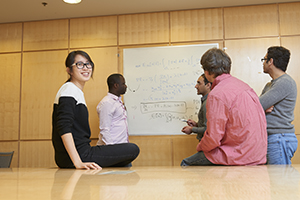Modelling and Computational Science (Doctoral program)
Overview
 The PhD in Modelling and Computational Science, led by interdisciplinary faculty, combines math, science, and computer science, focusing on impactful, high-quality research addressing societal needs.
The PhD in Modelling and Computational Science, led by interdisciplinary faculty, combines math, science, and computer science, focusing on impactful, high-quality research addressing societal needs. Mathematical modelling is an important tool in the study of physical and biological phenomena. The field of computational science combines the implementation of mathematical models, computer algorithms and knowledge in a particular area of application in order to provide an additional tool for the study of phenomena and, in particular, to facilitate the study of problems that are intractable or difficult to study using other approaches. Mathematical models and computational science are powerful methods to study problems such as atmospheric phenomena; climate variability; molecular behaviour of matter; protein folding; option pricing in financial markets; and many other physical, biological, medical, environmental and economic problems.
The
The objectives of the program are to provide opportunities for students to acquire knowledge and skills in mathematical modelling of real-world phenomena, computational science, computer programming and scientific communications. Graduates of the
Fields
- Computational Physical Science
- Scientific Computing
Admissions
Admissions
- Completion of a Master of Science (MSc) level degree in science, engineering or a related area from a Canadian university, or its equivalent from a recognized institution.
- A minimum B+ average (GPA: 3.3 on a 4.3 scale or 77 to 79 per cent).
Additional requirements:
Prior to being accepted into the program, PhD applicants must be accepted by a professor who specializes in the applicant’s desired area of research and is willing to act as a supervisor.
Required supporting documents:
Please see the for a list of supporting documentation that must be submitted with your application.
Required test scores for English language proficiency:
See for the minimum required test scores for this program.
Please see for specific dates. Note that the application deadlines listed are for both the online application and all supporting documentation.
Applications for admission to all graduate studies programs are submitted online. There are five steps you must go through to complete the application process. See for step-by-step instructions.
Many of our graduate programs are extremely competitive; the number of qualified applicants normally exceeds the number of seats available for each intake. Satisfaction of minimum entry requirements does not ensure admission.
Research areas
- Applied dynamical systems
- Climate modelling
- Computational nanoscience and molecular modelling
- Computational neuroscience
- Computer science
- Energy
- Fluid dynamics
- Industrial mathematics
- Materials science and photonics
- Medical imaging
- Nuclear physics
Learn more about the research areas within this program and find research experts by visiting the and the university's Expert Centre.
Additional information
- Loading...
- Loading...
- Loading...
- Loading...
- Loading...
- Loading...
- Loading...
- Loading...
- Loading...
- Loading...
- Loading...
- Loading...
- Loading...
- Loading...
- Loading...
- Loading...
- Loading...
- Loading...
- Loading...
- Loading...
- Loading...
- Loading...
- Loading...
- Loading...
- Loading...
- Loading...
- Loading...
- Loading...
- Loading...
- Loading...
- Loading...
- Loading...
- Loading...
- Loading...
Internal awards and funding
Applicants to research-based graduate programs who are studying full-time are automatically considered for some types of funding at the time of admission.
Types of funding that do not require an application:
- Entrance scholarships
- Minimum funding packages
- Teaching assistantships, research assistantships and graduate research assistantships
For more details on the above funding opportunities, see .
Please note: Part-time students are not eligible for the above funding opportunities.
External awards and funding
Graduate program applicants are encouraged to apply for to help finance their education. The application process differs for each competition, so review the information carefully to determine where and when you must apply. Please note: The majority of these awards are for domestic or permanent residents only.
Tuition fees for graduate programs are charged on a flat-fee or fee-per-credit basis and vary by program and student status.
For current, specific fees and details on flat-fee versus fee-per-credit programs, please see .
Contact the program:
Faculty of Science
905.721.3050
gradsecretary@science.ontariotechu.ca
Contact the School of Graduate and Postdoctoral Studies:
905-721-3190
connect@ontariotechu.ca